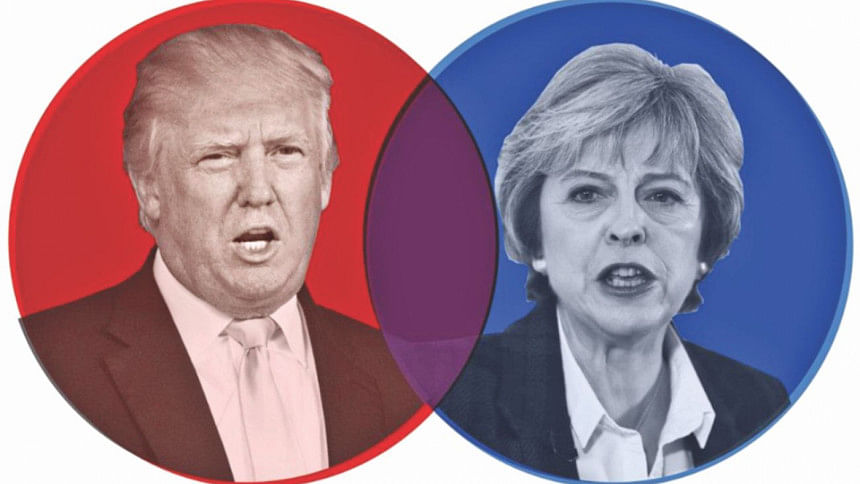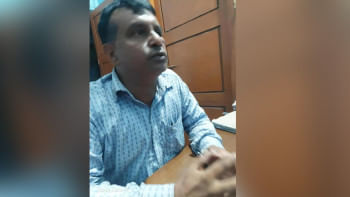Special relations - A moving feast!

Britain's special relations with the US may have come under stress; exactly the opposite of what British Prime Minister Theresa May had intended by embarking on a visit to the US last month.
A lot of dust has since been kicked up in Britain over Donald Trump's prospective State visit to the UK. The row was triggered by none other than John Bercow, the Speaker of the House of Commons, with any state visit addressing the Parliament "is not an automatic right; it is an earned honour", asserted the speaker without any ambiguity.
As a matter of fact, 1.8 million Britons have petitioned against Donald Trump's state visit to date; that would have been sufficient basis for a debate in the national Parliament on the issue. For, according to rules, the House is obliged to recognise and act on a petition by just a hundred thousand signatories.
In this context, the talk of the US president making a grandstanding joint speech to members of the House of Lords and the House of Commons is facing stiff resistance from detractors. They are making no secret of their agenda of downgrading the visit.
But the government is going ahead to accord the honour of a State visit to the US president in line with her Majesty's wishes. It is worth mentioning that state procedure had been followed as the Queen requested the Prime Minister to hand over an invitation to the US president for a state visit to the UK. And he accepted it.
Speaker Mr. Bercow's action riled some members of Parliament so much that they started a proceeding for his removal. This has failed miserably, garnering support of only five MPs to the motion.
Whatever may be the outcome of Trump's visit, if and when it takes place, the nostalgia of cousin-like relations between the US and UK at the defining moments of their history will keep appealing to them. After the devastating effect of the Second World War on Britain, the US lent huge sums of money to the British government for its reconstruction programmes. The British repaid the last installment of the loan only around the middle of 2000. Such has been the close US-UK ties.
There is another example of exceptional rapport between the two countries. The mutually endearing relations between Margaret Thatcher and Ronald Reagan were put to good use when Mrs. Thatcher famously persuaded Reagan to cast off his initial diffidence towards Mikhail Gorbachev. That way, many tend to think, the deck was cleared for Gorbachev's Perestroika and Glasnost to take hold on the Western mind. The far-reaching consequences are too known to bear any repetition.
A new version of special relations is in the offing. Shinzo Abe, the Japanese Prime Minister on his recent visit to the United States, put on the table his offer of a deal and what he expected from the US president in return. Abe would invest USD 450 billion in US infrastructure projects geared to create 700 thousand jobs in the US. Another USD 150 billion from the Japanese government pension investment fund might be available for a large swathe of job creation, the US president's favourite priority theme.
And, what is the once-pacific Japan looking for? It is quite a shopping list - the US to boost Tokyo's Missile Defense Protection system! All the more because of the North Korean ballistic missile tests. Tokyo also wants closer links to the US' early warning radar and satellite networks.
Actually Japan has long dreamt of acquiring a better offensive strike capability to deter both China and North Korea.
In all, Japan is ready to open its largesse for a security deal. It is also being so demanding because the US has killed off the TPP.
On Trump's list is a free trade agreement aimed at opening long-restricted sectors of Japan.
This is turning out to be an era of quests for special relations primarily on bilateral levels. You get to hear of Putin-Trump's mutual admiration topped up by far reaching far-right coalitions in quite a few European countries.
The process has been propelled by a beginning of disintegration in the EU set afoot by Brexit, rise of the far-right and break-up of multilateral trade and cooperation pacts. Where it will stabilise no one knows and that's where the danger lies.
The writer is a columnist of The Daily Star.

 For all latest news, follow The Daily Star's Google News channel.
For all latest news, follow The Daily Star's Google News channel. 



Comments